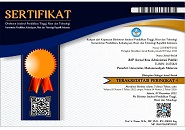Collaborative Governace in Post Earthquake Disaster Management on The Western Island of Java
Abstract
The geographical conditions of Indonesia which are on the Pacific Ring of Fire and are crossed by three world plates, the Eurasian plate, the Indo-Australian plate and the Pacific plate make Indonesia the most disaster-prone country, especially earthquakes. The large number of population in Indonesia contributes to the risk of life and social loss, physical loss, and economic loss. Based on this, the government seems to need more attention to disaster management efforts, which are multidimensional. On the other hand, disaster management in Indonesia have not yet become a national strategic issue and development goals so that resulting in disaster management in Indonesia are still not optimal due to the collaborative management processes that are not comprehensive and sustainable between the various levels of actors involved.
The purpose of this study is to analyze collaborative governance in the prevention of earthquake reconstruction rehabilitation in the Western Island of Java. This study uses a post positivism approach with qualitative research methods through in-depth interviews and documentation studies.
The results of this study indicate that it is needed: the objectives in post earthquake disaste management must consider providing solutions that can reach ordinary people, community independence and participation, human resources, technology, finance and legal as well as derivative rules, leader support, and collaboration between governments, non-governmental institutions, private sector, donor agencies, international agencies, universities and the communityKeywords
Full Text:
PDFReferences
Buku
Direktorat Kawasan Khusus dan Daerah Tertinggal. (2015). Kajian Kelembagaan dan Regulasi Untuk Mendukung Kebijakan Penaggulangan Bencana Dalam RPJMN 2015-2019. Bappenas
Frederickson, G. (2007). Whatever Happened to Public Administration?: Governance, Governance Everywhere. The Oxford Handbook of Public Management
Goldsmith, S., Eggers, W. D. (2004). Governing by Network: The New Shape of The Public Sector
LPPS-KWI & CORDAID. (2001). Penanganan Bencana: Kumpulan Bahan-Bahan Pelatihan Penanganan Bencana. Seri Forum LPPS No.43, LPPS-KWI: Jakarta.
Jurnal
Ansell, Chris, and Alison Gash. (2008). Collaborative Governance in Theory and Practice. Journal of Public Administration Research and Theory 18(4): 543-71.
Bingham, L. B., Nabatchi, T, O’Leary, R. (2005). The New Governance: Practices and Prosesses for Stakeholder and Citizen Participation in the Work of Governance. Public Administration Review, Vol. 65.
Coppola, D.P. (2006). Introduction to international disaster management. Butterworth-Heinemann Phillips, B.D., 2009. Disaster Recovery. Auerbach Publication.
Emerson, Kirk, Tina Nabatchi, and Stephen Balogh. (2012). An Integrative Framework for Collaborative Governance. Journal of Public Administration Research and Theory 22 (1): 1-29.
Emerson, Kirk, and Tina Nabatchi. (2015). Collaborative Governance Regime. Georgetown University Press: Washington, DC.
Hidayah, Kemal. (2015). Kebijakan Penanggulangan Bencana Di Era Otonom Daerah. Kajian Terhadap Penanganan Kasus. Jurnal Borneo Administrator. Vol 11 No. 3.
James, E. (2008), Getting ahead of the next disaster: recent preparedness efforts in Indonesia. Development in Practice, Vol.18.
Jessop, B. (1998). The Risk of Governance and The Risk of failure: The Case of Economic Development. Internasional Social Science Journal, Vol.50.
Koshimura, S. and Shuto, N. (2015). Response to the 2011 Great East Japan Earthquake and Tsunami Disaster. Philosophical Transaction Series A, Mathematical, Physical, and Engineering Sciences. 373(2053).
Lynn, L. E., Heinrich, C. J., Hill, C. J. (2000). Studying Governance and Public Management: Challanges and Prospects. Journal of Public Administration Research and Theory, Vol.10.
Monday, J. (2002). Building back better: Creating a Sustainable Community After Disaster. University of Boulder, Natural Hazards Research and Applications Information Center.
Olshansky, R. B., Chang, S. Johnson, L. A., Horne, J., & Nee, B. (2009). Shaken, shrinking, hot, impoverished and informal: Emerging research agendas in planning. Elsevier.
Osmar Shalih. (2019). Membangun Ketahanan (Resiliensi) Bencana Pada Kawasan Pariwisata (Studi Kasus Kabupaten Pandeglang Paska Tsunami 2018). Universitas Pertahanan.
Suranta, Sri. (2002). Dampak Motivasi Karyawan Pada Hubungan Antara Gaya Kepemimpinan Dengan Kinerja Karyawan Perusahaan Bisnis. Empirika.Vol 15. No 2. Hal: 116-138
Peraturan
Undang-Undang Nomor 24 Tahun 2007 Tentang Penanggulangan Bencana.
Undang-Undang No. 22 tahun 2008 Tentang Pengelolaan dan Pendanaan Bantuan Bencana
Modul
BNPB. (2015). Rencana Nasional Penanggulangan Bencana 2015-2019.
BNPB. (2017). Modul Manajemen Bencana.
Profil Sumber Daya Kesiapsiagaan Nasional Dalam Penaggulangan Bencana 2015.
DOI: https://doi.org/10.31764/jiap.v8i2.2686
Refbacks
- There are currently no refbacks.
JIAP (Jurnal Ilmu Administrasi Publik)

This work is licensed under a Creative Commons Attribution-ShareAlike 4.0 International License.
JIAP (Jurnal Ilmu Administrasi Publik) terindeks di:
EDITOR'S OFFICIAL:














.JPG)



.JPG)